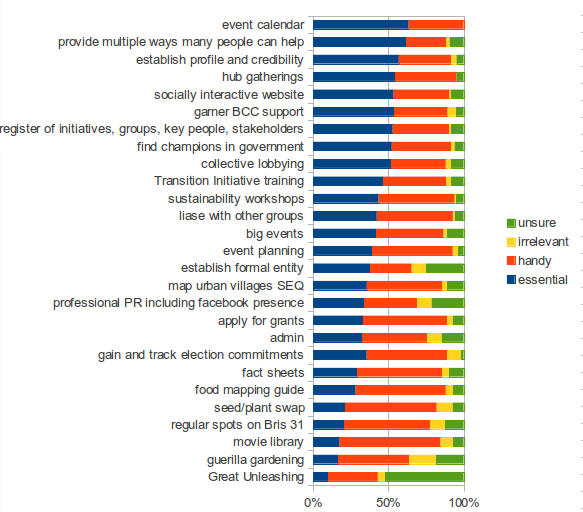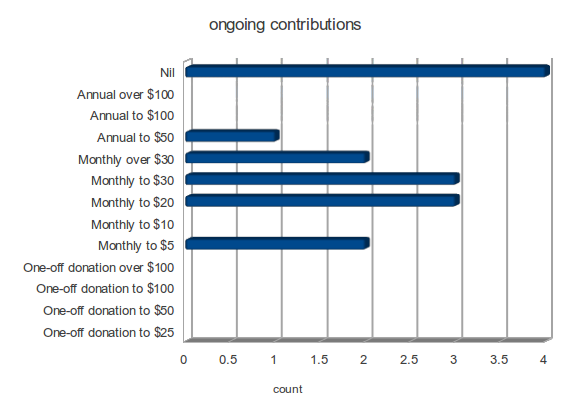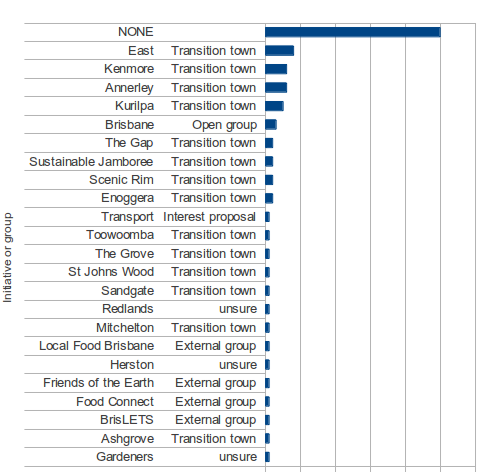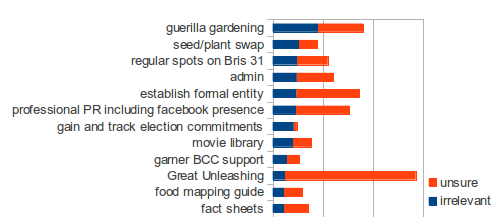Survey results – role of hub
General comments |
Of 1300 people on the Brisbane Transition ning, 122 answered the survey – thanks to those who took the time! Of those who took the survey, unfortunately I could only access the first 100 results (otherwise would have to pay exorbitant fees). Sorry to the people who’s input I’ve missed. And a very big thank you to Rob Austen for helping to analyse survey results – he came over to our place on two occasions and put in a number of hours of high quality survey analysis input. This has been a large job, to forumlate the survey, crunch the numbers, analyse results, and put it all up on the web; so also thank you to all the people who posted encouraging comments. | ||||||||||||||
Q1: What suburb do you live in? |
99 responsesSummary: As you’d expect – people popping up all over Brisbane. There were also a number of respondents from Sunshine coast, the Gold Coast, and SEQ hinterland. And one from someone who had moved to England… | ||||||||||||||
Q2: Which transition initiative? |
95 responses | ||||||||||||||
| View spreadsheet here.Summary: Of 95 responses, fully 50 identified as not being involved in any transition initiative (and a further 3 listed ‘Brisbane’ rather than a local initiative).A few people listed groups with similar aims but which to my knowledge are external to the transition movement (BrisLETS, Local Food, Food Connect, Friends of the Earth).
That said… there looks to be about a dozen transition initiatives within Brisbane, and a few outside (Toowoomba, Scenic rim). Only a few initiatives had more than 3 or 4 people fill in the survey (and one of those was Annerley, which half the respondents mentioned was defunct). Analysis: strong>I’m assuming that if you identify as a transition town… you are one! |
|||||||||||||||
Q3: What inspires you about TT? |
95 responses | ||||||||||||||
 |
View original responses hereSummary:
From 95 responses we analysed a number of themes running through the answers, and counted them as seen at left. Some examples: collaboration: “people acting with community spirit to achieve change” positive change: “it’s positive practical action focus” people: “the energy, drive and integrity of the people who are committed to implementing change at the local level” and one person even named a few: “Wilf, Rolf, Fiona et al” Localism: “that it is locally based, rather than issue-based (not that that is a bad thing, but there are sufficient groups doing issue-based work)” Preparation: “clear understanding of the coming problems and a proactive approach…” Future focus: “it’s necessity” … “positive views to deal with future problems” Systemic approach: “… it applies science-based reasoning with an ethic of caring for people and the planet” Belonging: “meeting other like minded peoples” … “… a strong emphasis on building local relationships” Interestingly, 3 people were NOT inspired – eg “I was inspired about the rhetoric but after attending a meeting or 2 I found it lacked substance, so I mostly delete the emails now” >Analysis: It is well worth reading the original responses to gain an insight into the richness of the appeal of the Transition movement in Brisbane. People are motivated on many levels, with sense of community (collaboration, people, belonging) and a positive approach being amongst the most heartfelt. We have a big soft spot for Transition Towns. |
||||||||||||||
Q4: Rank hub activities (overview/essential) |
87 responses | ||||||||||||||
 |
Summary:Overview (left) shows percentage breakdown of responses per item suggested, ordered firstly by how essential people thought it was.
In general, much support at hub level (>50%) for: events calendar, having ways to help out, raising profile, getting together, good website, government engagement (BCC support, champions, lobbying), keeping tabs of ‘who’s who’ (various registers). Less support at hub level (>40%) for, (but still interest in): training (Transition Initiative related, sustainability workshops), planning & putting on events, liason with other groups. And ambiguity about: establishing a formal entity, professional PR, admin. For the majority of people, items NOT essential (<35%) (at hub level) included applying for grants, tracking election commitments, food mapping, fact sheets, and a Great Unleashing (to name a few).
Analysis: This is a handy chart to see at a glance which activities have the most support. I would regard this as a first, tentative draft of priorities for the movement. |
||||||||||||||
Q4: Rank hub activities (handy) |
|||||||||||||||
 |
Summary:This is the list of items most people considered ‘handy’ rather than ‘essential’. Keep in mind the numbers: over 75% of people said a movie library would be handy; and over 50% of people said the next 15 items would be handy.
Analysis: These may be listed as ‘handy’ because these items are better performed at a local level than at hub level; or because they are in general a lower priority for people. That said, some of these would be ‘easy win’ projects, such as a movie library, seed swap, food map, or radio spots. Projects which would require a little more organisation might be fact sheets, workshops, applying for grants, and event planning. |
||||||||||||||
Q4: Rank hub activities (irrelevant/unsure) |
|||||||||||||||
|
|
Summary: Items listed as ‘irrelevant’ or ‘unsure’ have been graphed together here, and comments have been made based on the combination.
Guerilla gardening seems to have a ‘thumbs down’ response, with around 20% of respondents labelling it ‘irrelevant’. (Only about 15% thought it was essential). Interesting points: around 12% of respondents thought that things like admin, formal entity and PR were irrelevant (to hub operations). Compared to people who thought these things were essential or handy, this is a minority view, but it is important to note the divergence of opinions here. By far the biggest ‘unsure’ item was Great Unleashing. Analysis: >Uncertainty regarding Great Unleashing may be because it is a ‘not yet’; or because it is ‘not the role of hub’ … or because, actually, there’s quite a few people who don’t know much about it. |
||||||||||||||
Q5: rank roles of hub |
85 responses | ||||||||||||||
|
Summary:Question 5 (‘rank the roles of the hub’) is essentially a rephrase of all the detail in Question 4, with various activities categorised as shown at left.The results tally reasonably with Q4.
A majority think linking and advocacy are essential; presence and coordination have high support; and there is more ambivalence regarding events, projects and training. Analysis: the inspirational or high-level roles (linking, advocacy, presence) seem to have the most support, and concrete roles (events, projects, training) have less support. I expect that as a hub establishes a presence and identity, these more concrete roles will crystallise. |
||||||||||||||
Q6: Do we need a hub/office? |
86 responses | ||||||||||||||
 |
YES: 44.2% NO: 16.3% MAYBE: 39.5%Summary:
>The exact question was… do you think Brisbane needs a central hub or office? Of 86 people who answered, 38 said yes and 14 said no… but another 34 were not sure. Analysis: The blunt ‘yes/no/maybe’ figures seem to be quite ambiguous. Fortunately there was also space for comment, which demonstrated a badly worded question. Upon analysing the comments (at left), we found a number of themes. Yes, most people were supportive of a central hub… but for many, having a virtual (online) hub would be enough. Against that is a strong desire from others to have a place to visit. Analysis suggests that:
|
||||||||||||||
Q7: establishment – contributions |
58 responses | ||||||||||||||
 |
Detailed responses here.Summary:
Skills: organising, grant writing, workshops, admin, research Time: many offers, especially from the unemployed Grant writing: yes, no, maybe… Resources: car, space, computing, office, video production Other: letter box stuffing, social research, promotion. Regarding financial contributions (left), offers ranged from nil to one-off donations over $100; with others talking about monthly or annual donations. Analysis: The survey got a bit laborious here, and repetitive – sorry folks. People hooked off after the first lot of questions – 58 answered the ‘establishment’ set, and only 39 bothered with the ‘ongoing’ set of questions.Nevertheless, when asked what kinds of contributions people could make to both the establishment and ongoing running of a hub, many offers were made. Given the small number of respondents, this seems quite a generous impulse both for ‘in kind’ support and financial contributions. |
||||||||||||||
Q8: ongoing – contributions |
39 responses | ||||||||||||||
 |
Detailed responses here.Summary:Skills: admin, marketing, graphic design, editing, fact sheets, research, ‘keynote listening’, GIS, organising
Time: many offers, some quite a lot Grant writing: as above Resources: as above Other: setup, strategising, office work, maintenance of premises, writing stories. In the survey people were asked to give an idea of weekly contributions. There were a lot of numbers like $3, $4, $7… so I’ve worked out approximately what those responses would be as monthly averages. Analysis: Again, given the small number of respondents, there seems to be quite some range of contributions, with quite a few indicating they could pay $30 or more a month. A few people wanted to know more about the mission, goals, and setup details before committing dollars (fair enough). |
||||||||||||||
Q9: final comments“Thank you so much Gabrielle and Russell! Fully support your efforts. Have deliberately not committed at this stage. Will contact you in June when Joan and I return from UK. I would like to see how we could link in (vounteers) with other established orgs/systems such as Spiral who already have the expensive office infrastructure and I’m unsure of the need to set up a fullblown staffed centre of our own at this stage. Rahter than plunge right in, I would advocate growing into the whole thing – slower, but less chance of a spectacular crash and burn! Cheers, Chris Wright.” |
Read general comments. 39 responses.Summary: trong>Some broad themes which come out:
Analysis: It’s well worth reading these comments through – over three pages worth. Chris Wright’s response has been highlighted (left) as one which captures much of the feeling of the the survey. |















Hi there to all, since I am in fact keen of reading this webpage’s post to be updated daily.
It includes pleasant stuff.
Hi there to all, the contents present at this web page are truly amazing for people experience,
well, keep up the nice work fellows.
I am regular reader, how are you everybody? This post posted
at this website is in fact fastidious.
I look after Transition Town Kenmore and we are struggling to keep going. We had about 16 people at our meeting last night and wonder how much longer we can keep going.
I am wondering if the Transition movement in Brisbane is collapsing.
Please contact me and let me know what you think. Any suggestions would be welcome. I think your survey is great but until now I was unaware of it.
cheers
Lloyd
I look after Transition Town Kenmore and we are struggling to keep going. We had about 16 people at our meeting last night and wonder how much longer we can keep going.
I am wondering if the Transition movement in Brisbane is collapsing.
Please contact me and let me know what you think. Any suggestions would be welcome. I think your survey is great but until now I was unawae of it.
cheers
Lloyd
I`m in Comox Valley,BC Canada and am keen to hear what activities are most important around Brisbane TT we are still mulling after a year.
Thanks, Nick
I am very interested in the sequel to this. Who can make it on April 14, afternoon, to discuss? Russell and Rob worked really hard on this, let’s use it!
Thanks for your efforts to formalise this communication…welll done.
I like the slow steady, relaiable, thoughtful, collaborative approach too. It may be more sustainable.
122 of 1300 is almost 10 percent….excellent considering paid surveys only get 1-4 %. Pity you only access 100 of them.
Keep up the great wrok and kind energy! I means a lot to feel connected.